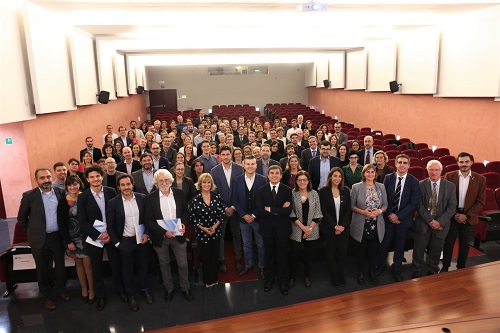The 2018 edition of La Marató raised €15M for the 43 projects and 96 teams awarded.
The project entitled “Understanding YAP-mediated mechanotransduction in pancreatic cancer” led by Pere Roca-Cusachs and co-led by Miguel Ángel del Pozo Barriuso (Centro Nacional de Investigaciones Cardiovasculares, CNIC) received 300.000€ of funding for the next three years. The project aims to understand how tissue stiffness affects pancreatic cancer. Specifically, will put its focus on the role of a molecule called YAP, which activates specific genes and is known to play a role both in pancreatic cancer and in cell response to stiffness. Thanks to this project, it will be possible to develop tools to understand the molecular mechanisms by which pancreatic tumours respond to stiffness through YAP, and what the implications are in order to be able to design novel drugs against pancreatic cancer. Pancreatic cancer is the fourth cause of cancer-related deaths across the world. Once it is diagnosed, it also has the lowest survival rate of all major cancers, as only 2-10% of diagnosed people survive after five years. Chemotherapy and radiation therapies are well established, but survival rates are still extremely low, and patients experience tumour relapse and resistance to therapies is very frequent.
On the other hand, Xavier Trepat is co-leader of the project “T-cell exclusion during cancer immune evasion and immunotherapy failure: cell types, transcriptional programs and biomechanics ” Together with Eduard Batlle from Institute for Research in Biomecidine, coordinator of the project and Holger Heyn of the Centre for Genomic Regulation, they will investigate the mechanisms used by the tumor cells to prevent migration and the function of immune cells in colorectal cancer. This knowledge will be used to develop a new classes of immunotherapies to treat this type of tumor, and potentially others that use similar strategies. Many types of tumors such as colorectal cancer inhibit the ability of the immune system to eliminate this disease by impeding the migration of immune cells into the tumor, which causes resistance to current immunotherapies. The project has a duration of 3 years and has a budget of 400,000 euros.
Finally, Núria Montserrat co-leader of the project “Identification of Kidney Cancer progression targets and biomarkers through CRISPR engineered organoids and xenograft mouse models” together with Laura Izquierdo from “Institut d’Investigacions Biomèdiques August Pi I Sunyer” and Oriol Casanovas, coordinator of the project, from “Institut d’Investigació Biomèdica de Bellvitge”. The project pursues to tackle renal cell carcinoma clear cell subtype (ccRCC) progression from unique and innovative angles taking a step further in the generation of ccRCC engineered kidney organoids or mini-kidneys and their derived xenograft models for the identification of new pathways and targets for ccRCC progression. Subsequently, full clinical validation in two series of ccRCC patients will be carried out to ascertain the role of the indentified molecules as putative targets for ccRCC. This knowledge will allow to further implement these molecules as tools for treatment of advanced ccRCC in the clinical setting. Renal cell carcinoma is an aggressive type of cancer and its clear cell subtype (ccRCC) is the most frequent. Although this type of cancer has been extensively studied there is an important lack of targeted therapies that are effective for this disease. Therefore, there is an important unmet medical need to identify new pathways and markers of this in order to improve the therapeutic efficacy and prognosis for this disease. The project has a three-year duration and has a total budget of 400.000€.
The opening committee of the ceremony was made up of the Presidency and Health Counselors, Meritxell Budó and Alba Vergés; Núria Llorach, Vice President of the Corporació Catalana de Mitjans Audiovisuals and the Board of Trustees of the La Marató de TV3 Foundation; Joan Sala, president of the Academy of Medical and Health Sciences of Catalonia and the Balearic Islands; Lluís Bernabé, director of the La Marató de TV3 Foundation; and by Robert Fabregat Barberà, general director of Research and Innovation of the Department of Health.
The 2019 edition of La Marató will be dedicated to raising money for rare diseases, and will launch on 16th December 2018.






